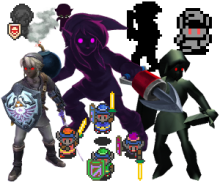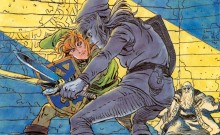Why Dark Link Should play a Larger Role in Zelda
Posted on November 25 2013 by Cameron Smith
 Dark Link is one of Link’s most famous recurring foes, having appeared in six different Zelda games, with his similar-yet-different doppelganger, Shadow Link, appearing in a further two games. This means that some version of Dark Link has appeared, roughly, in every second Zelda game. So why are his roles in each game so small? Dark Link is Link’s opposite: everything that Link is, Dark Link isn’t. I believe that this could make for a very personal and beautiful storyline in a future Zelda game, and with the (somewhat) recent magnificent storytelling that we were treated to in Skyward Sword, it’s likely that Nintendo will continue this trend (I am yet to play A Link Between Worlds, so I can’t talk about the story in that game), and I would like them to continue this trend with a story that focuses on Dark Link as his own character, and this is why.
Dark Link is one of Link’s most famous recurring foes, having appeared in six different Zelda games, with his similar-yet-different doppelganger, Shadow Link, appearing in a further two games. This means that some version of Dark Link has appeared, roughly, in every second Zelda game. So why are his roles in each game so small? Dark Link is Link’s opposite: everything that Link is, Dark Link isn’t. I believe that this could make for a very personal and beautiful storyline in a future Zelda game, and with the (somewhat) recent magnificent storytelling that we were treated to in Skyward Sword, it’s likely that Nintendo will continue this trend (I am yet to play A Link Between Worlds, so I can’t talk about the story in that game), and I would like them to continue this trend with a story that focuses on Dark Link as his own character, and this is why.
Dark Link’s first appearance was in Zelda II: The Adventure of Link, in which he was known as Link’s Shadow. Here, he served as the final boss of the game, being the last trial that Link had to overcome in order to prove his worth and claim the Triforce of Courage. This is often considered the largest role that Dark Link has played in any Zelda game, as he posed the greatest threat here. However, I disagree.
Shadow Link is considered to be different from Dark Link due to the fact that Dark Link was and is a recurring enemy and boss, whilst Shadow Link was an actual character in the storyline of Four Swords Adventures. I’ve always thought differently, thinking of Shadow Link as just a different incarnation of Dark Link with a different name, much like how Dark Link was called Link’s Shadow in The Adventure of Link. The shear fact that Shadow Link was a character, not just an enemy, in this game means that this is the largest role he has played in a Zelda game.
 In Four Swords Adventures, Shadow Link is a key figure in the story, being the one who captures Princess Zelda and the Seven Maidens at the start of the game and who tricks Link into drawing the Four Sword from its pedestal, releasing Vaati. However, Shadow Link also serves as a simple enemy and boss, because an endless army of Shadow Links are created from the Dark Mirror by Ganon. Given this similarity between the purpose of Shadow Link and Dark Link, how are they different? Furthermore, Shadow Link in A Link Between Worlds is an optional foe that you can choose to challenge, which further associates the two enemies. So, considering Link’s Shadow, Dark Link, and Shadow Link to all be one enemy, he has appeared in eight of 17 Zelda games. And in all of these games, the most that Dark Link has amounted to is being the final boss in The Adventure of Link.
In Four Swords Adventures, Shadow Link is a key figure in the story, being the one who captures Princess Zelda and the Seven Maidens at the start of the game and who tricks Link into drawing the Four Sword from its pedestal, releasing Vaati. However, Shadow Link also serves as a simple enemy and boss, because an endless army of Shadow Links are created from the Dark Mirror by Ganon. Given this similarity between the purpose of Shadow Link and Dark Link, how are they different? Furthermore, Shadow Link in A Link Between Worlds is an optional foe that you can choose to challenge, which further associates the two enemies. So, considering Link’s Shadow, Dark Link, and Shadow Link to all be one enemy, he has appeared in eight of 17 Zelda games. And in all of these games, the most that Dark Link has amounted to is being the final boss in The Adventure of Link.
So why should Dark Link play a larger role? Firstly, and primarily, because he deserves it. Having appeared in almost half of the Nintendo-released Zelda games, he is the second-most often recurring enemy in the series, behind Ganon/Ganondorf. Ganon started out as simply being the final boss of The Legend of Zelda, and while he was a little more integral in the backstory of the game, he didn’t play much of a role in the game itself before the final battle. In comparison, Link’s Shadow was the final boss in The Adventure of Link, and while having no mention in the backstory of the game, he, like Ganon, played no other role in the game itself before the final battle. So how is it fair that Ganon went on to become an integral villain of the series while Dark Link was forced to become a recycled enemy?
Secondly, Dark Link has so much potential to be a true, flesh and blood character! Dark Link is Link’s opposite: for everything that Link is, Dark Link isn’t; for everything that Link does, Dark Link doesn’t; for every one of Link’s successes, Dark Link has had failures; where Link is courageous and high-spirited, Dark Link is cowardly and self-loathing. To see such opposing characters to collide would be epic, in every sense of the word!
If you knew that you were failing literally because of somebody else (and you had a murderous mindset), what you do? You’d eliminate them, right? If they can’t succeed, then you can’t fail. As such, Dark Link could have such a deep, burning, true hatred for Link. Funnily enough, the only other villain in the Zelda series who has held a personal grudge against Link was Ganon/Ganondorf. We haven’t seen this grudge expanded upon before, which is something that a future game featuring Dark Link as the primary antagonist could do.
Going back to the idea of this game having a very personal story, let’s also rethink what you’d do if you were failing because somebody else was succeeding. You wouldn’t just eliminate them, you’d want to prove that you can be as good as them, you’d want to have what they have. In addition, Shadow Link and Link’s Shadow are also said to be manifestations of Link’s dark side. If you were half of a whole, you’d want just as much as attention as the other half is getting, right? The other half cannot be complete without you. Again, you would want to prove that you are as good as the other half. A storyline like this could see Dark Link deposing Link and taking everything that is rightfully his: the success, the reward, and even the glory and the girl (in some cases).
 People have talked about the creation of a Zelda trilogy, in which a third game for the Hero of Time would show his redemption… but from what? Who, or what, could possibly bring the Hero of Time to his knees and make him beg for mercy, only to have the tables turned and for good to once again triumph? I’ll tell you who: Dark Link. While Link and Dark Link are not equal, they are equally as strong. If there was anybody who could bring Link down, it would be Dark Link.
People have talked about the creation of a Zelda trilogy, in which a third game for the Hero of Time would show his redemption… but from what? Who, or what, could possibly bring the Hero of Time to his knees and make him beg for mercy, only to have the tables turned and for good to once again triumph? I’ll tell you who: Dark Link. While Link and Dark Link are not equal, they are equally as strong. If there was anybody who could bring Link down, it would be Dark Link.
This is why I believe that Dark Link should play a larger role in a future Zelda game: he could be the ultimate villain, Link’s greatest enemy, as opposed to his second-most persistent one. What do you guys think? Does Dark Link deserve a larger role in a Zelda game? If so, how do you think it would work? Let me know in the comments.



